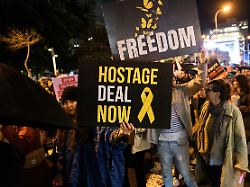White House optimistic
Talks about hostage deal are heading in a “good direction”
January 30, 2024, 3:54 a.m
Listen to article
This audio version was artificially generated. More info | Send feedback
Hamas should release all hostages, and Israel will stop fighting in the Gaza Strip for two months: This is what a possible deal envisages, which will be discussed in Paris at the weekend. There is still a lot to do, says US representative Kirby. Nevertheless, Washington is cautiously optimistic.
After talks about a possible new ceasefire in the Gaza war and the release of more hostages, the US government has expressed cautious optimism. “We can’t talk about an impending agreement yet, but based on the discussions we had over the weekend and in the last few days, we feel that it is moving in a good direction,” said the National Security Council communications director , John Kirby, in Washington. But there is still a lot to do.
Representatives from the USA, Israel, Egypt and Qatar held discussions in Paris at the weekend. The talks are expected to continue this week. Good progress has been made in the consultations to at least lay the foundation for a path forward, Qatari Prime Minister and Foreign Minister Mohammed bin Abdulrahman Al Thani told the US broadcaster MSNBC on Monday. The hope is to make a proposal to Hamas and “bring it to a point where it contributes positively and constructively to the process.” This is the only way to de-escalate the situation.
Before the consultations, there was a clear demand for a permanent ceasefire – this possibility exists, said Al Thani. On the hostage issue, Qatar is an important mediator between Hamas and Israel, who do not speak to each other directly.
The New York Times reported on Sunday night, citing US government circles, that US negotiators had drawn up a draft based on proposals from Israel and Hamas. The deal could therefore stipulate that Hamas releases more than 100 hostages and that Israel stops its military action in the Gaza Strip for around two months. In a first phase, the fighting should be paused for 30 days. During this time, Hamas should release female, elderly and injured hostages. In parallel, both sides should negotiate a second phase in which Israeli men and soldiers taken hostage would be released for a further 30 days of ceasefire.
Compared to the seven-day ceasefire in November, during which hostages and Palestinians imprisoned in Israel were exchanged, the fighting would then last significantly longer. Hamas abducted around 240 hostages to the Gaza Strip in its brutal attack on Israel on October 7th. An estimated 1,200 other people were killed in the massacre. Since then, Israel has launched a major ground and air offensive against Hamas in the Gaza Strip. According to estimates, just over 130 people are still in the hands of the Islamists.
